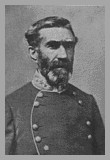Home>Biographies>Bragg
General Braxton Bragg
General Braxton Bragg was the Confederate commander at the Battle of Perryville. Born in Warrenton, North Carolina, on March 17, 1817, Bragg was an 1837 graduate of the U.S. Military Academy at West Point, where he graduated fifth in his class. After serving with distinction in the Seminole war and the Mexican War, Bragg left the army in 1856. Before the Civil War, Bragg ran a sugar plantation in Louisiana. With the outbreak of the conflict, he joined the Confederacy.
In March 1861, Bragg was commissioned a brigadier general and was sent to protect the Gulf Coast from Mobile to Pensacola. Promotions came quickly to Bragg, who was gifted at organizing armies. In September 1862, he was promoted to major general. Transferred to Tennessee, Bragg commanded a corps at the Battle of Shiloh. When the overall Confederate commander was killed in action, Bragg eventually assumed command. After reorganizing the army, Bragg invaded Kentucky.
During the initial stages of his Kentucky campaign, Bragg performed well. His army moved quickly and besieged a Union garrison at Munfordville. However, critics in the army claimed that Bragg lost his nerve whenever the Federal army was nearby. Furthermore, he was fooled by a Union diversion that made him think that he faced a minor force at Perryville. Instead, his 18,000 Confederates confronted 58,000 Federal soldiers. Despite these overwhelming odds, only 20,000 of the Union troops were engaged in the fighting and the Confederates won a tactical victory. After the fight, Bragg realized he was outnumbered and left Kentucky.
Later, Bragg led his army at Stones River, Chickamauga, and Chattanooga. Continually criticized, he was eventually replaced by General Joseph E. Johnston. Bragg served as military advisor to Confederate President Jefferson Davis, and ended his military career serving under Johnston in North Carolina. After the war he was an engineer. He died in Galveston, Texas, on September 27, 1876. He is buried in Mobile, Alabama.
